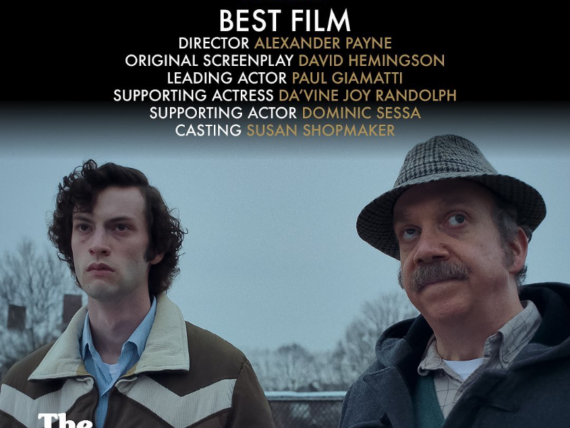Helen Tope reviews Parasite, showing in our cinema until Thursday 5th March [SOLD OUT].
Sharp, funny and beautifully observed, Parasite was the surprise winner at this year’s Oscars. Directed by Bong Joon Ho, Parasite – a part-comedy / part-thriller – has transitioned into the mainstream, and the implications for cinema – for audiences and film-makers alike – are huge.
Bong Joon Ho gives us a portrayal of contemporary Korean society that is Dickensian in its intricacy. We meet the Kim family, underemployed and unambitious, living in virtual squalor. Mum, Dad and two siblings jostle for space (and free Wi-Fi) in the slums of Seoul. Living in a semi-basement, their ability to pull themselves out of poverty can only be met by undertaking piece work. Making up pizza boxes, their work is deemed shoddy and part of their wages, deducted. But as the pizza manager chastises them, we quickly learn that the Kim family are charmers. They try to persuade her to take on their son, Ki-woo (Choi Woo-sik) as a new employee.
But Ki-woo’s fate does not rest on ingratiating himself with Korea’s pizza elite. His school friend, Min, arrives at the Kims’ apartment and asks to meet with him. A rung or two up the ladder from the Kims, Min is a university student. He is leaving to study for a few months, and needs someone to cover his teaching post with the wealthy Park family. Ki-woo asks why one of Min’s university friends wouldn’t be a better (and more qualified) choice, Min comes clean. He has made a connection with the Park’s daughter, Da-hye (Ji-so Jung). His confident, macho friends would undoubtedly try to steal his girl. Shifty and weedy, Ki-woo is the perfect choice. His girlfriend will be perfectly safe. Min can offer a personal recommendation of Ki-woo’s teaching prowess to the Park family, and he’s in.
Kim Ki-woo gladly accepts the lucrative role, and begins life as a tutor. His walk to work takes him from housing where residents live cheek to jowl, to secluded private roads. Entering the Park residence, Ki-woo steps into another world. A beautiful, spacious house, a lush, green garden. The differences between Korea’s haves and have nots are self-evident.
Shown into the kitchen by housekeeper Moon-gwang (Jeong-eun Lee), Ki-woo is interviewed by the lady of the house. Yeon-ik (played by Yeo-jeong Jo) is not the walkover Min suggested she would be. Definitely on something, but still together enough to sniff out an interloper, she insists on sitting in on her daughter’s first lesson. Just to be sure.
His pupil, Da-hye (Ji-so Jung) is shy but coquettish – Ki-woo definitely sees her appeal. With just the right balance of sternness and encouragement, Ki-woo does enough to bluff his way through the lesson. Chatting with Yeon-ik afterwards, she introduces him to her youngest child. Proudly displaying his colourful paintings next to their wedding pictures, Yeon-ik explains that her son, Da-song, has been described as an artistic genius. He needs a good art teacher to develop his talent.
Ki-woo’s sister, Ki-jung, enters stage right. With forged documents from Illinois State (Ki-Jung is a whizz at Photoshop) she joins the household. Having googled art therapy, she points out areas of psychological concern in Da-song’s work. This isn’t just a tutoring job, suggests Ki-jung. This is art therapy, and that costs extra.
The two siblings work their way into the lucrative Park household, and spot other areas of opportunity. The unlucky chauffeur proves easy to get rid of, and the Kims’ father steps into the role (a great performance from Kang-ho Song). But the housekeeper – a formidable Jeong-eun Lee – is too shrewd and watchful. A lucky discovery (the housekeeper has a severe allergy to peaches) is the Kims’ next move. Staging a medical emergency, and playing on Yeon-ik’s neuroses, the housekeeper is out. The final member of the Kim family, Chung-sook, is hired. The Parks are unaware of the deception.
The Kims’ resourcefulness is affectionately detailed by Bong Joon Ho. The Dickensian influence, seen at the start of the film, filters through into the characters – confident and bolshy, Ki-jung (played by So-dam Park), belongs on the pages of Oliver Twist. And while Ki-woo is far too streetwise to read as Oliver – much of the scheming is under his direction – his eventful journey places him square in the tradition of Dickens’ heroes. Flawed but with the potential to thrive.
Sitting through the film up to this point, we think we know how this is going to pan out. Bong Joon Ho’s masterful but unobtrusive direction leads us through a familiar narrative. The roguish Kims are on the rise, but they will go too far.
But Bong Joon Ho is known for his mixing of genres, and Parasite is a film that doesn’t reveal its hand until we are comfortable in the Park / Kim dichotomy. Parasite, in the space of a minute, upends the narrative with a phenomenally-staged plot twist. The Kim family are in danger of being exposed. They, and we, are now playing a different game.
Bong Joon Ho, along with fellow screenwriter Jin Won Han, creates a South Korea that is all too recognisable to Western audiences, and may in part, help to account for its success. The lowly Kims and the wealthy Parks are placed side by side for us to compare. The Kims’ ramshackle existence is undercut by a strong familial bond (Parasite can boast some great ensemble acting). While they have every material comfort, the Parks lead separate lives. Mr Park chooses to spend long hours at work, while Da-hye eagerly texts Ki-woo. A bored Yeon-ik plans a lavish birthday party for her son. It will be the event of the season.
The effects of capitalism control both the Parks and Kims in ways they cannot determine. Prosperity in the Parasite world operates on connections, recommendations. If not for Ki-woo’s friendship with Min, the natural gifts of the Kim children, in this tightly-ordered hierarchy, would continue to be overlooked. Ki-woo scrabbling for work, and Ki-jung unable to afford school fees, Da-hye and Da-song by comparison can expect an easy transition into adulthood. Fortune favours the fortunate.
Parasite is more than a socio-economic commentary – although it excels at this – Bong Joon Ho delves into comedy, horror and suspense to make a film that defies category. Borrowing from Western film-making tradition (there is more than a nod to Hitchcock in the later scenes), Bong Joon Ho’s film is a multi-national, multi-tonal masterpiece. Great film crosses boundaries, but Bong Joon Ho seems intent on smashing through each and every one. Film without definition, with influences from across the globe. Parasite points the way ahead for cinema in the 21st century: bold, enigmatic and without compromise.
Helen Tope









Comments
No comment yet.